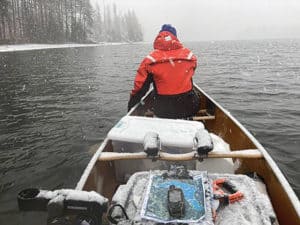As spring temperatures arrive, the Vermont Department of Environmental Conservation (DEC) is inviting Vermonters to report when lakes and ponds lose their ice cover, known as the “ice-out date.” The spring date when a lake becomes completely ice free from shore to shore lets DEC staff scientists know the best time to begin their seasonal water quality sampling efforts.

A staff scientist collects water samples on Mollys Falls Reservoir in Marshfield shortly after lake ice-out in early spring. The ice-out date is also important to help assess the impact of climate change on Vermont’s lakes and ponds.
Since 1977, scientists with the department have been collecting spring water quality information on lakes larger than 10 acres in size. When lakes are covered in ice, the water underneath is layered or stratified into sections based on water temperature and density. Soon after the ice cover is gone in the spring, the water layers weaken and mix together. Water samples collected at this time of mixing show the total amount of phosphorus a lake will have available to fuel algae and aquatic plant growth throughout the year.
The ice-out date is also important to help assess the impact of climate change on Vermont’s lakes and ponds. Using long-term records of lake ice, scientists are hoping to better understand statewide and regional climate trends.
“We collect ice-in and ice-out information in order to assist with water quality monitoring but also to track Vermont’s changing climate”, says Mark Mitchell, a limnologist with Lake Champlain Sea Grant and the Vermont Department of Environmental Conservation. “We are seeing trends of earlier lake ice-out dates across New England, which can be an indicator of climate change.”
The Department of Environmental Conservation has an online ice-out reporting form that the public can use to share their observations.
Many lake communities around the state hold ice-out contests, usually in the form of a raffle where the winners can receive prizes or cash. Some of the more famous and long-running ice-out contests are on Joes Pond in Danville, Lake Memphremagog, and Lake Iroquois in Hinesburg. Silver Lake in Barnard also has a contest.These contests are an engaging way for lake associations and communities to encourage folks to observe lakes and ponds throughout the year.




